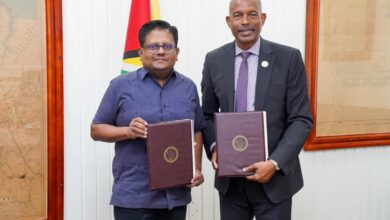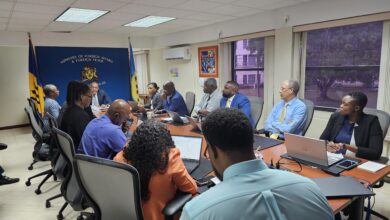“The 7th Caribbean Food Security and Livelihoods Survey results provide a basis for the CARICOM 25 by 2025 initiative, a visionary initiative aimed at reducing the region’s food import bill by a quarter by the year 2025. This goal is not just about economic numbers; it is a comprehensive strategy to enhance food sovereignty, bolster local agriculture, and fortify the Caribbean against external shocks. The survey’s findings therefore are pivotal, providing data-driven insights that inform policies and actions to achieve this initiative. By understanding the current state of food security, the survey helps identify gaps and opportunities in the regional food system, ensuring that efforts are well-targeted and effective.”– Ambassador David Prendergast, Director, Sectoral Programmes, CARICOM Secretariat
Hon. Chet Greene, Minister of Foreign Affairs, International Trade and Immigration, Antigua and Barbuda,
Hon. Zulfikar Mustapha, Minister of Agriculture, Guyana
Hon. Samal Duggins, Minister of Agriculture, Fisheries, Marine Resources, Entrepreneurship, Cooperatives and Creative Economy, St. Kitts and Nevis,
Mr. Regis Chapman, World Food Programme (WFP) Country Director Caribbean Multi-Country Office;
Representatives of Government Institutions, UN Agencies, Non-Governmental Organizations, the Media;
Farmers and CARICOM Citizens
The launch of the 7th Caribbean Food Security and Livelihoods Survey marks a significant step forward in our collective understanding of the region’s food security challenges and reflects a deep commitment to addressing the critical issues of food access, nutrition, and sustainable agriculture.
The previous Caribbean Food Security and Livelihoods Surveys have provided critical insights into the region’s challenges. Key findings have highlighted the persistent impact of price increases on purchasing power, the socioeconomic repercussions of the COVID-19 pandemic, and the ongoing threat of natural hazards. These surveys have been instrumental in capturing the lived experiences of the people of the Caribbean, particularly in relation to food access, market availability, and overall livelihoods.
A quick preview of the data to be presented today in the 7th Food Security and Livelihoods Survey reveals that despite a 17% improvement over the past year, food insecurity in the Caribbean remains high, with 43% of the population struggling to meet basic food needs. The situation is exacerbated in the Small Island Developing States (SIDS), where 96% of the respondent’s report rising food costs, attributed to heavy reliance on imports, geographic isolation, and small economies. Additionally, climate-related threats and natural disasters continue to undermine the region’s food security, with a significant portion of the population affected. The results highlight the ongoing challenges facing the region in achieving a sustainable and resilient food system.
The 7th Caribbean Food Security and Livelihoods Survey results provide a basis for the CARICOM 25 by 2025 initiative, a visionary initiative aimed at reducing the region’s food import bill by a quarter by the year 2025. This goal is not just about economic numbers; it is a comprehensive strategy to enhance food sovereignty, bolster local agriculture, and fortify the Caribbean against external shocks. The survey’s findings therefore are pivotal, providing data-driven insights that inform policies and actions to achieve this initiative. By understanding the current state of food security, the survey helps identify gaps and opportunities in the regional food system, ensuring that efforts are well-targeted and effective.
The importance of this survey to the CARICOM 25 by 2025 initiative cannot be overstated. It serves as a barometer for the progress made and the challenges that remain. The initiative focuses on increasing the production and consumption of local foods, thereby reducing reliance on imports. This shift not only supports Caribbean farmers and economies but also promotes healthier diets through the consumption of fresh, locally grown produce. Moreover, by fostering a more self-reliant food system, the Caribbean can better withstand global supply chain disruptions, price volatility, and the impacts of climate change.
Furthermore, the initiative aims to stimulate economic growth by creating jobs in the agricultural sector, encouraging innovation, and attracting investment. It also seeks to improve transportation and logistics for agricultural products, making it easier for farmers to get their goods to market. The survey’s role in this is to provide the evidence base that guides these improvements, ensuring they are grounded in the reality of the Caribbean’s unique context.
The 7th Caribbean Food Security and Livelihoods Survey is not just a collection of data. It is a tool for empowerment, enabling CARICOM Member States to take charge of their food futures. The Survey’s findings will help to shape a more resilient, sustainable, and prosperous Caribbean, where food security is a cornerstone of regional stability and prosperity. As such, it is a critical component of the CARICOM 25 by 2025 initiative, underpinning efforts to transform the Caribbean’s food landscape for the better.
As we move forward, the insights gained from this survey will be instrumental in crafting strategies that not only mitigate current challenges, but also enhance the resilience of our food systems against future threats. It is a proactive measure that underscores the importance of regional cooperation and data-driven decision-making in safeguarding the well-being of Caribbean communities.
We again thank the WFP and all other of our partners for spearheading the series of surveys which have tapped into the pulse of the issues surrounding Food and Nutrition Security and which remains among the highest priorities in CARICOM.
Thank you.






